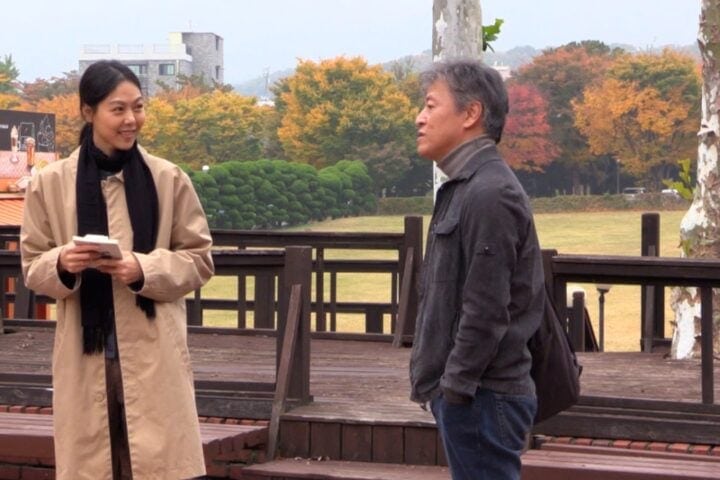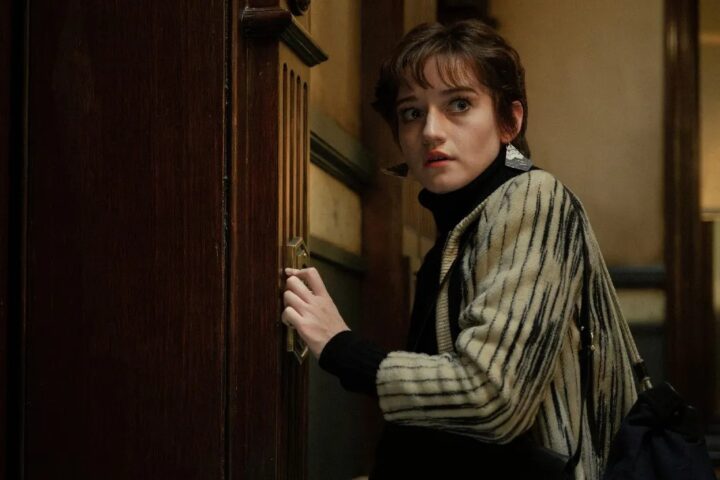Hong Sang-soo’s films have tricky narrative juxtapositions and symbols that often render potentially mundane moments transcendent. In Our Day, for instance, is composed of a handful of talky plot strands that are subtly connected by props and recurring references in the dialogue. Turn away at a pivotal juncture and you risk failing to grasp the film’s anatomy, as its essence resides in how carefully and fleetingly those and other strands coalesce.
In A Traveler’s Needs, though, Hong’s sleight of hand with narrative is less consistent than usual. For a long stretch of the film’s running time, Hong appears to have built the wrong concept around the wrong actor, giving Isabelle Huppert a conceptual role that leans hard on her brand of curt whimsicality. Kim Min-hee, a veteran of similar roles in Hong’s films, as well as his partner and a key collaborator behind the scenes, might’ve made a meal of this part, suffusing it with a customary sense of gravity and turmoil. But Huppert stays outside of the character, leaving a hole at the center of A Traveler’s Needs that’s atypical for Hong’s films.
Iris (Huppert) is a French bohemian knocking around Seoul. Like the poet of In Our Day or the novelist of The Novelist’s Film, she’s a nucleus around which others orbit. Put less kindly, she’s a structural necessity for placing disparate characters and plotlines together in the same film, and, in the case of A Traveler’s Needs, this contrivance sticks out. Unlike the aforementioned poet or novelist, Iris isn’t memorable, especially given that Huppert has long specialized in these sorts of only-in-the-movies free spirits. Hong and Huppert haven’t seemed to have considered Iris beyond her narrative function, or beyond her pixie-hipster Huppert-ness.
Iris teaches French to Seoul residents, utilizing a method that she has made up herself. She asks her students to share their personal feelings about certain events and actions, then translates those feelings into audiotapes and handwritten notes in French. Iris believes the language will be easier to learn if her students personalize their study guides, rather than by the rote memorizations offered by textbooks. Iris, then, is a translator as shrink, an outsider as cathartic agent. And this gimmick, unusually sentimental for Hong, is both intriguing and hokey.
The notion of people crossing a language barrier via their personal memories is poignant, and A Traveler’s Needs benefits from Hong’s mastery of scenes that unspool over long takes, in which slips of the tongue can lead to personal revelations. In the first of the film’s three major acts, for instance, Iris works with Isong (Kim Seung-yun), discussing in English Isong’s feelings about her piano playing, which she’s shared with Iris. Isong’s answers are polite and superficial at first, as she says that she feels happy as she plays the music. Iris keeps pushing though, and gradually Isong admits that her feelings of inadequacy as a musician weigh her down as she plays.
Hong has always been alive to how casually people can confess to their longings and self-hatred—to how they hide through talking rather than behind silence, as well as to how easily someone can be pushed into revealing themselves, should someone else bother to push. Kim’s understatement is so perfectly calibrated and wrenching throughout this opening sequence that you my find yourself missing her when she soon exits the film.
From there, A Traveler’s Needs finds Iris prodding the tensions that define the lives of various characters as she wanders in and out of parks and apartments. Played by other recognizable Hong regulars such as Lee Hye-young and Kwon Hae-hyo, these characters are all vividly sketched, but the supporting players have a habit of stealing the film out from under Huppert before moving on, leaving us stranded time and again with the film’s least interesting character.
The poet and the novelist of In Our Day and The Novelist’s Film, respectively, had demons of their own, and those demons informed how they brought out the emotional wreckage in other characters. By contrast, very little is revealed of Iris in A Traveler’s Needs, and, even on metaphorical terms, it can be difficult to believe that residents of Seoul would submit to a language course made up on the fly by an outsider that sounds like a scam. The absurdity of this premise is acknowledged but only truly informs the film’s final act.
It’s eventually revealed that Iris is crashing with a much younger Seoul man, Inguk (Ha Seong-guk), who isn’t asking for rent from her despite his need to live carefully paycheck to paycheck. Hong’s mastery of slippery tones re-emerges during this final act, and even Iris’s thinly rendered personality comes to feel purposeful. There appears to be a sexual current in this friendship, and Inguk especially seems drawn to Iris, but the particularities of their arrangement are never revealed, perhaps because Inguk and Iris don’t know them either.
Or, perhaps, Iris is exploiting the young man’s attraction to her, which, if true, potentially casts a darker light on the film’s previous episodes. Hong invites this ambiguity, and it gives direction to Huppert’s performance, which grows stronger and with disconcerting suddenness. In these scenes, Huppert now has something purposefully intangible to play: the possibility, or not, that Iris’s fish-of-water savant routine obscures calculating impulses.
When Inguk’s mother, Ranhee (Ha Jin-wha), arrives, A Traveler’s Needs morphs into an Oedipal dramedy of sorts, with Iris’s presence inflaming old wounds between mother and son. The long sequence between Inguk and Ranhee is classic Hong, with the mother asserting her presence and her concern via a litany of exquisitely intricate inquisitions, including even a dollar-by-dollar accounting of Inguk’s income and spending. In the process, Inguk, a young man with one foot still in the door of mommy’s figurative home, is at once humiliated and comforted.
Inguk arises as one of Hong’s vintage man-children: enthralled with women, desperate to be his own person, and for the moment hopeless as to how to go about realizing this aim. With Hong back on familiarly neurotic, lacerating terrain, A Traveler’s Needs snaps into focus. The variableness of this movie—perhaps intentional after all, perhaps ultimately reflective of Hong’s characteristic sleight of hand—is the risk of a working method as rapid and intuitive as Hong’s, but even in this unusually uneven film fruit is eventually born.
Since 2001, we've brought you uncompromising, candid takes on the world of film, music, television, video games, theater, and more. Independently owned and operated publications like Slant have been hit hard in recent years, but we’re committed to keeping our content free and accessible—meaning no paywalls or fees.
If you like what we do, please consider subscribing to our Patreon or making a donation.





